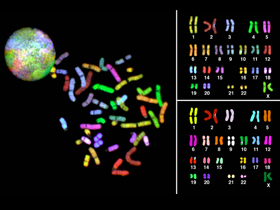Breaks and shifts in the genetic data in living things are described as mutation. These affect and damage the DNA in the cell nucleus. Every cause giving rise to mutation-generally, some form of chemical effects or particle emissions-is known as a mutagenic factor.
Substances such as mustard gas and nitric acid may be given as examples of chemical mutagenic factors. X-rays or the radiation leaking from a nuclear power station are examples of radioactive mutagenic effects. Particles emitted from a radioactive element can cause damage to DNA. When high-energy particles strike DNA bases, they alter their structure, and usually cause changes of such dimensions that the cell cannot repair them. (See Mutation: An Imaginary Mechanism.)


